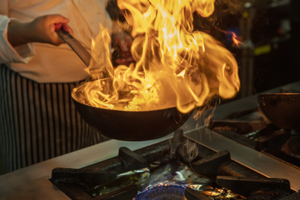
A Hot Restaurant Kitchen Can Make The Rest of Your Building Hot
If you can't stand the heat, get out of the kitchen!
We all know that commercial kitchens can get very hot. But did you know that the heat generated in those kitchens can cause other areas of your building to get hot as well? And make your building's air conditioning units work harder in common areas. So the question is, can a hot kitchen impact the rest of your building?
The answer is ABSOLUTELY! The heat from a commercial kitchen can and does make the rest of a building hotter, especially if the kitchen is not properly ventilated. Cooking equipment such as ovens, stovetops, and fryers generate a significant amount of heat. If this heat is not properly exhausted, it can accumulate in the kitchen and spread to other areas of the building through convection or air currents. Sometimes those air currents pass through common areas of the building or through spaces above drop ceilings, or even through or over walls that separate spaces.

Additionally, the use of high-temperature cooking equipment like grills, broilers, and fryers can produce smoke, grease, and other particles that can contribute to the buildup of heat and affect the air quality of the surrounding areas. This can result in increased humidity and unpleasant odors, which can make the indoor environment uncomfortable for occupants.
To mitigate these issues, it is important to properly ventilate the kitchen by ensuring that there are no blockages in the grease duct. Grease ducts that are 100% clean from the top of the hood the whole way through your building to the rooftop allow for adequate capture and exhaust rates. This ensures that heat and cooking contaminants are not spreading to other areas of the building.

